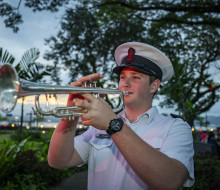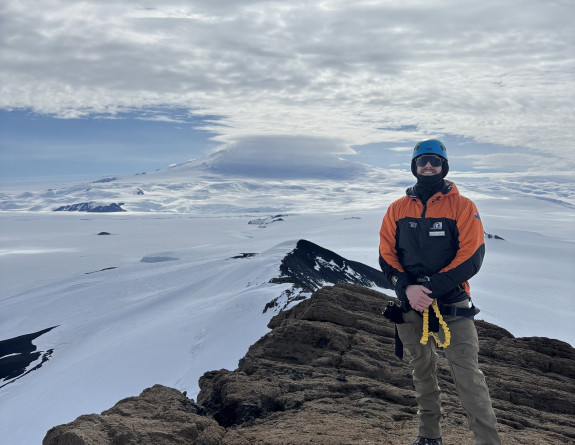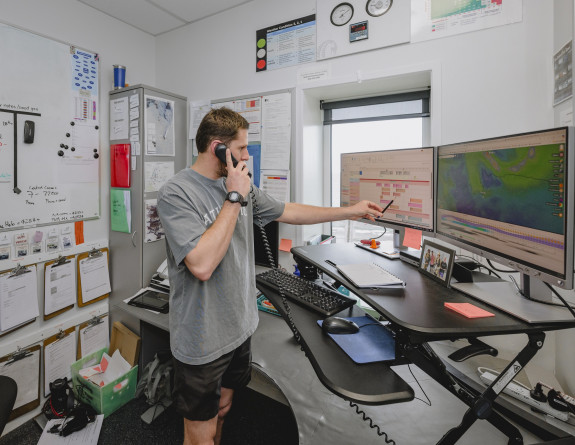
Taupō trumpeter in demand in brand new career with Royal New Zealand Navy Band
26 August 2025
Unfortunately you are viewing this website on an outdated browser which does not support the necessary features for us to provide an adequate experience. Please switch to a modern browser such as latest version of Google Chrome, Mozilla Firefox, Apple Safari or Microsoft Edge.
Ngā mihi nui
The bay sitting just outside Scott Base is normally crammed with sea ice. But for the first time in a few years, the ice has broken away filling the cove with deep blue water, giving Sergeant Cam Sproull the rare opportunity to watch a pod of orca hunting
The avionics technician from Ōhope, Bay of Plenty, has spent the summer season in Antarctica for the New Zealand Defence Force’s Operation Antarctica, which is finishing up for the year.
Sergeant Sproull arrived for his six-month deployment in -40°C temperatures in September last year.
“When I arrived all I wanted to do was take photos, but I hadn’t adapted to the temperature. It took no time at all before I was very uncomfortable and couldn’t feel my fingertips.”
His role at Scott Base is in the communications team, and monitoring field events on the ice is a far cry from his usual work on helicopters.
“Our primary role is to maintain contact with all the field events in various places in the Ross Island region. We will talk with them at least once a day to make sure everyone is safe. Then we pass on any requests that they may need, like food or equipment supplies – we pass that along here to other groups here at Scott Base who will make a plan to satisfy those requests.”
While the team operates the communication equipment 24/7, it is also put to work doing stocktake audits, washing linen, printing notices and flight schedules, and making daily PA announcements with weather updates, new information, birthdays on base and a joke or two.
During overnight shifts, they look after air conditioning units, hot water cylinders and generators to ensure Scott Base stays warm.
“We call them ‘mouse rounds’, because we’re like little mice scurrying around checking things. There’s also lots of outside buildings and containers we check in the evenings,” Sergeant Sproull said.
“At the start of the season when we were checking them we were rugged up with jackets, face masks, goggles and boots because it was so cold and it would take a while to get kitted up. But in the height of summer you’d be in a hoodie, shorts and crocs.”



Royal New Zealand Air Force Avionics Technician Seargeant Cam Sproull spent the summer season in Antarctica for The New Zealand Defence Force’s Operation Antarctica, which is finishing up for the year.
Sergeant Sproull’s deployment had been amazing, with days packed full of activities, he said.
“I’ve been lucky to fly out to the Dry Valleys, on mainland Antarctica, to help pack up a campsite that was the base for Italian and New Zealand scientists researching the area’s geology. Not everyone gets a chance to go out there, so that was a privilege.”
There was another team looking at the sea ice and using robotic equipment to study methane seeps from the ocean floor – an indication of global warming and the effects on ecosystems, he said.
“There are people down here looking at the ozone layers and what effect global warming has on that. There’s a huge amount of science going on here. It’s very busy.”
In October, Sergeant Sproull looked upon the last sunset before the summer season started 24 hours of daylight.
“It set about 2am, so there was a group of us who climbed that in the middle of the night and watched the last sunset of the season.
“There’s also the marathon that takes place in January. I did it the full 42km with no training and I hurt for two weeks after that. It was a huge struggle to walk around base and there are lots of level changes here – lots of stairs.”
Antarctica is always cold and it’s imperative to pay close attention to weather forecasts, but the height of summer can be manageable with blue skies and no wind, Sergeant Sproull said.
“About two weeks ago summer ended and it started getting quite a bit colder again. You notice the sun is lower in the horizon at night, so it’s not far away from the first sunset of the season. This deployment has been an amazing experience.”